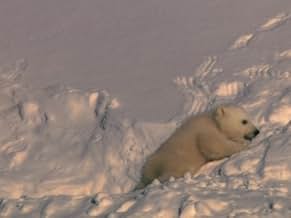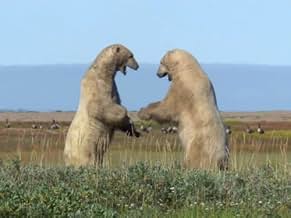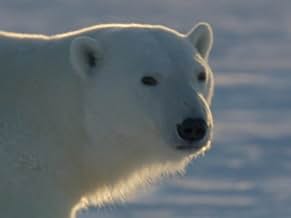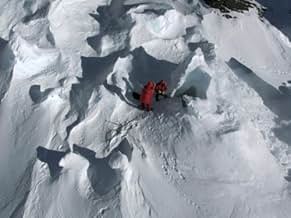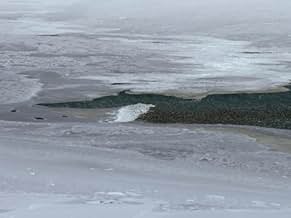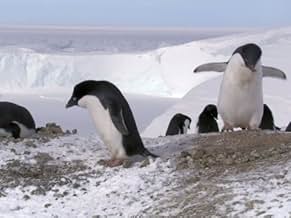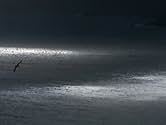Focuses on life and the environment in both the Arctic and Antarctic.Focuses on life and the environment in both the Arctic and Antarctic.Focuses on life and the environment in both the Arctic and Antarctic.
- Won 4 Primetime Emmys
- 13 wins & 9 nominations total
Browse episodes
Summary
Reviewers say 'Frozen Planet' is acclaimed for its breathtaking cinematography and David Attenborough's engaging narration. The series excels in detailing animal behavior and adaptation, offering both educational and emotional value. Behind-the-scenes segments enhance appreciation for the production team's efforts in extreme environments. However, some note repetitive content and a slight focus on human impact, though these are minor compared to the series' overall quality.
Featured reviews
If you decide to watch "Frozen Planet", you might want to think twice if you are squeamish or if you're watching with small children. This is because it depicts nature in the raw...and that sometimes means footage of animals killing each other or dying from exposure. I personally prefer this over an overly sanitized program...but it's best you know and understand this so you can make the appropriate choice.
The film is about both the Arctic and Antarctica and most of the episodes consist of showing the same season in each region. So, for example, the summer in the Arctic would be June-September but in Antarctica you are seeing its summer from December-March. During the course of the episodes you see the usual amazing footage you see in the other recent "Earth" documentaries with David Attenborough...and you often marvel at the people who went to such lengths to get such perfect film. Pretty amazing...and marvelous on a large television.
I think this is a nearly perfect show. My only complaint, and it's a minor one, is that some of the material is repetitive and really noticable if you are binging on the show. I honestly feel they could have edited out an episode or two to make it much more compact.
The film is about both the Arctic and Antarctica and most of the episodes consist of showing the same season in each region. So, for example, the summer in the Arctic would be June-September but in Antarctica you are seeing its summer from December-March. During the course of the episodes you see the usual amazing footage you see in the other recent "Earth" documentaries with David Attenborough...and you often marvel at the people who went to such lengths to get such perfect film. Pretty amazing...and marvelous on a large television.
I think this is a nearly perfect show. My only complaint, and it's a minor one, is that some of the material is repetitive and really noticable if you are binging on the show. I honestly feel they could have edited out an episode or two to make it much more compact.
This is a wonderful documentary covering the Arctic and Antarctica sections of our planet. You see these two regions through 4 seasons, through the eyes of it's inhabitants (mammals, birds, fish and humans). It captures the beauty, harsh weather and life in all of its glory and challenges. We get to see a thorough glimpse in life of all key animals. The 4 season covers, love, birth, growth, survival, death. We also get to see the life of human beings who live around Arctic circle. It is a tough and simple life.
The show is very informative and very entertaining. Highly recommended. If you love nature or want to know more about this planet, check this out. I am now sifting through IMDb to find more such shows.
The show is very informative and very entertaining. Highly recommended. If you love nature or want to know more about this planet, check this out. I am now sifting through IMDb to find more such shows.
Though I don't particularly enjoy animal documentaries, the second run of the BBC's "Frozen Planet" was on the Guardians list of top TV of last year, so I needed to give it a try. Despite the fact it's not a narrative-based show I still decided to watch the initial run from 2011 first. The effort involved is admirable, but as a documentary I found it to be a little repetitive.
The poles at either side of our planet are among the most inhospitable areas to exist. There are, however, various ecosystems that do survive there, with the changing seasons providing them with enough respite to either feed, breed or migrate as required. Polar Bears, Seals, Penguins and Orcas are amongst those species' films by the documentary, that uses underwater filming and time lapse photography to get unbelievably close to the animals.
This is probably the BBC at it's finest. An altruistic environmental documentary, beautifully shot in high definition and with a David Attenborough voiceover that can only be described as Iconic. The amount of personal sacrifice that goes into making a series like this is truly inspiring, with the "Freeze Frame" sections at the end of each episode giving us an insight into the conditions endured, and perils risked in order to get the footage. The footage is worth it though and even without the educational aspect just looking at what they captured would be enough. The final episode of the series is a change of pace, and focuses on human interaction in the polar regions, with both native people who live and hunt there, exploration bases and mining operations.
This might be a drawback caused by watching all the episodes in just a few days, rather than spacing them out one a week, as it would have originally been released, but there is quite a bit of repetition in the series. Some of this is endemic, Animals essentially eat, procreate, and die so if it's not doing one of these things, it's doing the other. More than that though, some specific bits of the series, I'm thinking specifically of the Orca's iceberg destruction technique and various bits of the penguin walks are shown more than once.
It doesn't derail the series which, like all of them, is a unique and fascinating insight into these ecosystems.
The poles at either side of our planet are among the most inhospitable areas to exist. There are, however, various ecosystems that do survive there, with the changing seasons providing them with enough respite to either feed, breed or migrate as required. Polar Bears, Seals, Penguins and Orcas are amongst those species' films by the documentary, that uses underwater filming and time lapse photography to get unbelievably close to the animals.
This is probably the BBC at it's finest. An altruistic environmental documentary, beautifully shot in high definition and with a David Attenborough voiceover that can only be described as Iconic. The amount of personal sacrifice that goes into making a series like this is truly inspiring, with the "Freeze Frame" sections at the end of each episode giving us an insight into the conditions endured, and perils risked in order to get the footage. The footage is worth it though and even without the educational aspect just looking at what they captured would be enough. The final episode of the series is a change of pace, and focuses on human interaction in the polar regions, with both native people who live and hunt there, exploration bases and mining operations.
This might be a drawback caused by watching all the episodes in just a few days, rather than spacing them out one a week, as it would have originally been released, but there is quite a bit of repetition in the series. Some of this is endemic, Animals essentially eat, procreate, and die so if it's not doing one of these things, it's doing the other. More than that though, some specific bits of the series, I'm thinking specifically of the Orca's iceberg destruction technique and various bits of the penguin walks are shown more than once.
It doesn't derail the series which, like all of them, is a unique and fascinating insight into these ecosystems.
Looking spritely as ever David Attenborough returned to the BBC with yet another brilliant documentary series, this time focusing on the seasons across the polar regions at either end of the earth. Spread over six parts, each season gets an episode followed by one on the lives of human in the regions and then an episode on how the regions have changed over time (and temperature). I'm not really a regular viewer of shows such as this, but I do come out for the big guns of the genre and the Attenborough/BBC names tend to be of the highest quality (plus the clip of the criminal penguin that was released as a promo convinced me to watch).
It is hard to fault Frozen Planet for what it does because it is technically impressive and stunningly filmed but yet has more than enough content and specifics to prevent the show being taken as just an excuse to show off your HD TV or have visual wallpaper for an hour (although having said that, it performs that task too and needs to be seen in HD). Although it covers a lot of ground, the show perfectly captures a sense of the extremes and of the remarkable forms of life that live in and around them, some we have seen before and some we have not and I found it as engaging to see familiar creatures as I did to learn of caterpillars that freeze completely solid only to thaw out and continue living when the ice retreats. As is to be expected, some of the presentation is a touch anthropomorphised but mostly the show is pretty honest about the chances of survival and is not afraid to show us the fates of creatures who are simply unlucky or misjudge their situation. Although one tries to watch it as a documentary it is hard not to feel something when you've just watched a baby bird survive a very rough landing on its first flight, only to be grabbed by a passing fox! The final two episodes are weaker by comparison because there is less of the animals and more of the human condition and bigger picture, but they are both fascinating. I came to the fifth episode not expecting much but the study of select communities did impress – not so much those that go there with money and technology, but those that hunt and live there; the shot of the man on a rope harvesting eggs on a cliff-face was a high point. The final episode just about avoids politics by mostly just showing things and leaving the rest to the viewer, but it was still an unusual part of the show compared to other series.
As always the filming is incredible and I do enjoy the little snippets at the end of each episode where we see how they were done and the frustrations and challenges of trying to get these great shots. The results are brilliant though, whether it is a camera dropped into a creature's burrowed hole, underwater shots of whales hunting as a pack or a hunt taken from far above in a helicopter; all of them are visually impressive and often breath-taking. The degree of access and intimacy is equally impressive and it is this that really makes the show as the viewer really feels part of an environment that the vast majority of us will never see or experience for ourselves. Over all this Attenborough's familiar tones inform and entertain – on top of his genre as ever but yet modest to the end.
Frozen Planet was a great series, really hard to fault as it delivers across the board for the vast majority of its run.
It is hard to fault Frozen Planet for what it does because it is technically impressive and stunningly filmed but yet has more than enough content and specifics to prevent the show being taken as just an excuse to show off your HD TV or have visual wallpaper for an hour (although having said that, it performs that task too and needs to be seen in HD). Although it covers a lot of ground, the show perfectly captures a sense of the extremes and of the remarkable forms of life that live in and around them, some we have seen before and some we have not and I found it as engaging to see familiar creatures as I did to learn of caterpillars that freeze completely solid only to thaw out and continue living when the ice retreats. As is to be expected, some of the presentation is a touch anthropomorphised but mostly the show is pretty honest about the chances of survival and is not afraid to show us the fates of creatures who are simply unlucky or misjudge their situation. Although one tries to watch it as a documentary it is hard not to feel something when you've just watched a baby bird survive a very rough landing on its first flight, only to be grabbed by a passing fox! The final two episodes are weaker by comparison because there is less of the animals and more of the human condition and bigger picture, but they are both fascinating. I came to the fifth episode not expecting much but the study of select communities did impress – not so much those that go there with money and technology, but those that hunt and live there; the shot of the man on a rope harvesting eggs on a cliff-face was a high point. The final episode just about avoids politics by mostly just showing things and leaving the rest to the viewer, but it was still an unusual part of the show compared to other series.
As always the filming is incredible and I do enjoy the little snippets at the end of each episode where we see how they were done and the frustrations and challenges of trying to get these great shots. The results are brilliant though, whether it is a camera dropped into a creature's burrowed hole, underwater shots of whales hunting as a pack or a hunt taken from far above in a helicopter; all of them are visually impressive and often breath-taking. The degree of access and intimacy is equally impressive and it is this that really makes the show as the viewer really feels part of an environment that the vast majority of us will never see or experience for ourselves. Over all this Attenborough's familiar tones inform and entertain – on top of his genre as ever but yet modest to the end.
Frozen Planet was a great series, really hard to fault as it delivers across the board for the vast majority of its run.
10Bert45
I was looking forward to this BBC series and I was not in any way disappointed. The work that went in to bringing us these wonderful visions of the polar regions is amazing. Thankfully, in New Zealand, we saw the David Attenborough-narrated version as it was meant to be. No disrespect to Alec Baldwin, who narrated the US version, but Sir David has been there and done that in wildlife film-making for the best part of 60 years. He KNOWS what he's talking about. I'm very aware of the "controversy" that surrounds the seventh episode titled On Thin Ice, and the apparent reluctance of US TV to show it because it deals with climate change. My advice is: don't let anyone tell you that this is a piece of climate change propaganda. It's not. It simply lays out the facts in a non-judgmental way and backs them up with historical photography and clear satellite imagery. Watch it and make up your own mind.
Did you know
- Trivia44 cinematographers to shoot the whole documentary.
- ConnectionsEdited into Universum: Eisige Welten - Das Reich der Kälte im Bann des Klimas (2017)
- How many seasons does Frozen Planet have?Powered by Alexa
Details
- Release date
- Countries of origin
- Official site
- Languages
- Also known as
- David Attenborough's Frozen Planet
- Filming locations
- Production companies
- See more company credits at IMDbPro
- Runtime1 hour
- Color
- Sound mix
- Aspect ratio
- 16:9 HD
Contribute to this page
Suggest an edit or add missing content







